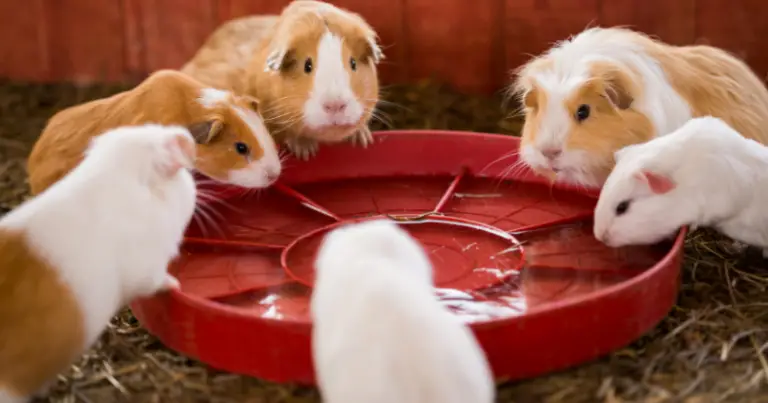Can You Overfeed a Guinea Pig? Feeding Facts for Pet Owners
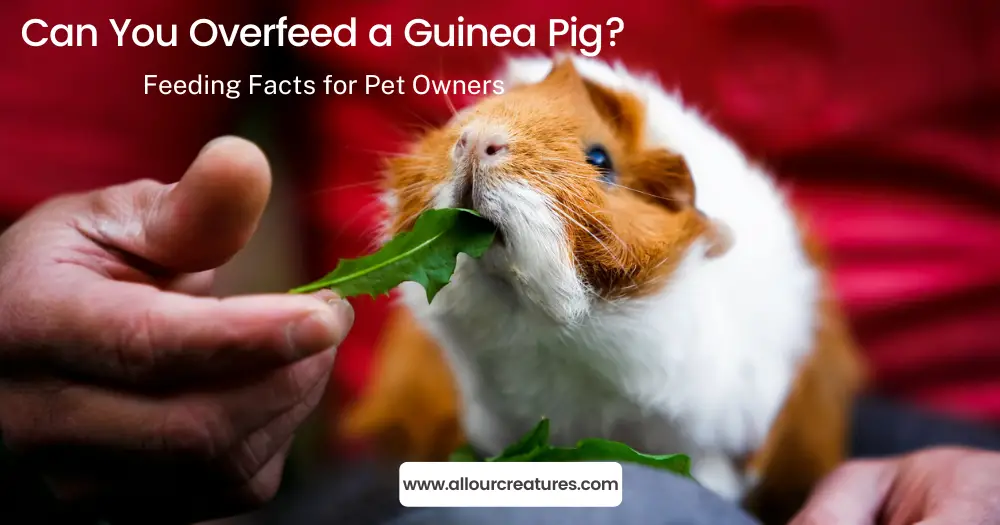
Are you a proud pet owner of a delightful adult or baby guinea pig? Congratulations! Guinea pigs make wonderful companions, and it’s essential to provide them with the best care possible. One of the key aspects of their well-being is their diet. But have you ever wondered, “Can you overfeed a guinea pig?” Well, let’s delve into the feeding facts that every pet owner should know.
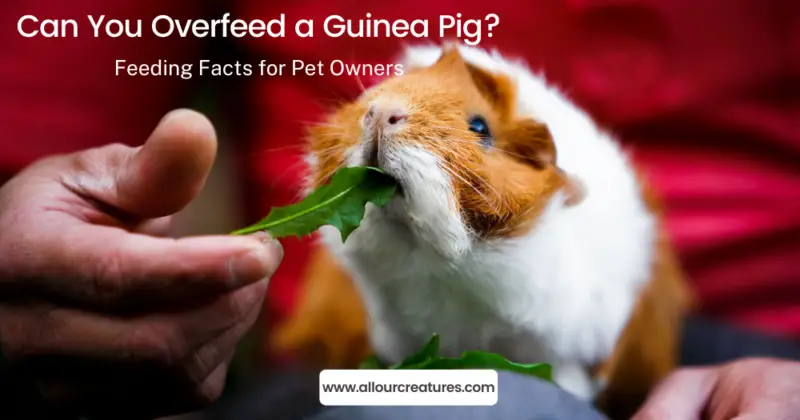
From the ideal cup of guinea pig pellets to the importance of fresh fruits and vegetables, we’ll explore the dos and don’ts of guinea pig nutrition. Whether you rely on pet stores for guinea pig food or prefer to offer fresh foods, we’ll cover it all.
Additionally, we’ll discuss the significance of fresh grass, green beans, and other green vegetables in maintaining a guinea pig’s healthy weight. So, grab a carrot, and let’s dig into this mouthwatering topic together!
Contents
Table of Contents
Can You Overfeed a Guinea Pig? Feeding Facts
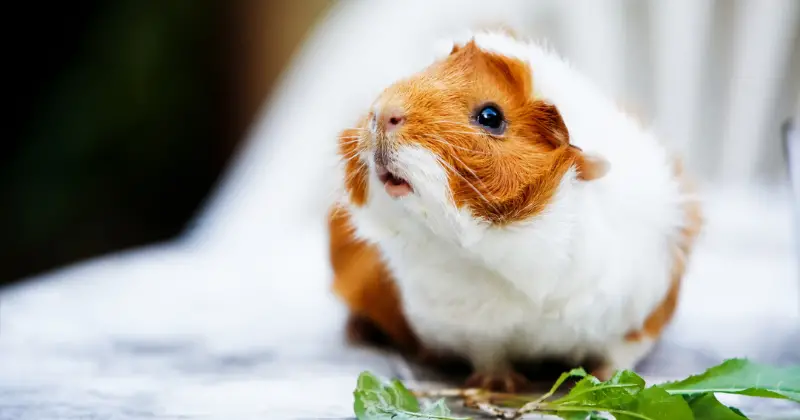
Guinea pigs can make delightful pets with their charming personalities and relatively low-maintenance care requirements. One important aspect of looking after your furry friend is ensuring they maintain a healthy diet. A common concern among guinea pig owners is whether it’s possible to overfeed these little creatures.
You can overfeed a guinea pig, which tends to occur when they’re given excessive amounts of sugary treats, empty calories, and store-bought treats. To avoid overfeeding your guinea pig, monitoring their food intake and providing the right nutrition that meets their dietary needs is crucial.
This article will explore various ways to keep your guinea pig’s diet balanced, wholesome, and in the appropriate quantities to ensure their health and happiness.
Understanding Guinea Pig Diet
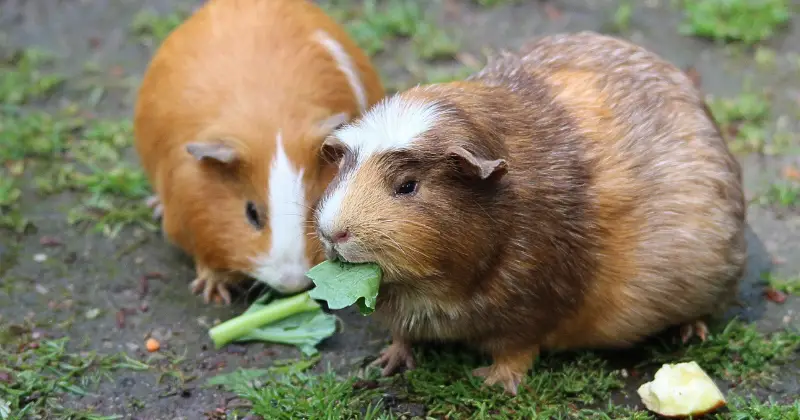
Guinea pigs are herbivores, which means their diet consists mostly of plant-based foods. A balanced and healthy diet for a guinea pig is important to ensure they receive all necessary nutrients and maintain proper digestion.
A major component of a guinea pig’s diet is hay. In fact, about 80% of their diet should be grass hay, such as timothy hay or alfalfa hay. Hay provides essential fiber that aids in digestion and helps keep their teeth trimmed. Guinea pigs require an unlimited supply of hay, as they’re constantly eating.
In addition to hay, guinea pigs enjoy a variety of vegetables like leafy greens, bell peppers, and carrots. Vegetables provide essential vitamin C, which guinea pigs cannot produce on their own. However, it’s crucial not to overdo it with veggies, as too much can lead to an imbalanced diet and potential health issues.
Pellets also play a part in a guinea pig’s diet, but should be fed in moderation. High-quality pellets contain a mix of essential nutrients, including protein and calcium. Be cautious when selecting pellets, as some products contain unnecessary fillers and added sugars.
Though guinea pigs can enjoy fruit as an occasional treat, it’s important to remember that fruits are high in sugar and should be limited. Overfeeding sugary foods can result in obesity and other health problems.
Finally, guinea pigs need access to clean and fresh water at all times to stay hydrated and aid in digestion.
By providing a diverse, balanced diet that includes hay, vegetables, pellets, and limited fruit, you’ll be ensuring your guinea pig receives all the necessary nutrients and maintains good health.
Risks of Overfeeding Guinea Pigs
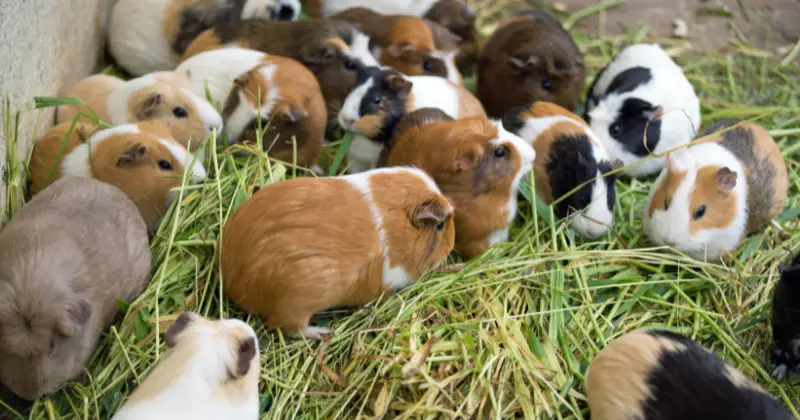
Overfeeding your guinea pig can lead to several health issues that may reduce their quality of life. One common consequence of overfeeding is obesity. Guinea pigs that consume too much food, especially sugary treats and fruits, can quickly gain weight and become overweight.
Obesity in guinea pigs can cause a variety of health problems. One major concern is the increased risk of diabetes due to high sugar intake. Additionally, an imbalanced diet high in calcium can lead to the formation of stones in the urinary tract, causing bladder and kidney issues.
An overfed guinea pig may also experience bloating and changes in their normal bowel movements. This can negatively affect their digestive system and potentially lead to gastrointestinal stasis. Gastrointestinal stasis is a serious condition where the gut slows down and stops moving, which can be life-threatening if not treated promptly.
Another concern related to overeating is tooth decay. Unlike other animals, guinea pigs’ teeth never stop growing. They need a diet rich in hay to help grind down their teeth and prevent overgrowth. However, if an overfed guinea pig consumes too many soft and sugary foods, they might not be chewing enough hay to keep their teeth healthy, leading to dental problems.
To prevent these health risks, providing your guinea pig with a balanced diet consisting of 80% hay, 15% fresh vegetables and herbs, and 5% commercial pellets is essential. Monitoring their food intake and weight will help ensure they remain healthy and happy.
Do I feed too much? How Much Food is Enough for your Guinea Pig? Watch this
Proper Portion Sizes and Frequency
Feeding your guinea pig the right portions and at the appropriate frequencies helps avoid overfeeding. While each guinea pig is unique, the following are general guidelines for portion sizes and feeding frequency.
Guinea pigs should be provided with an unlimited amount of hay throughout the day. The hay is their primary food source and is crucial in maintaining their dental and digestive health.
For their daily servings of fresh vegetables, younger guinea pigs (under six months) can have around 1/2 to 1 cup, while adult guinea pigs should receive 1 to 2 cups, based on their individual needs and preferences. Choose nutrient-rich veggies like leafy greens, bell peppers, and tomatoes to meet your guinea pig’s dietary requirements.
It’s essential to monitor your guinea pig’s weight and age when determining their portion sizes. A kitchen scale comes in handy for this purpose. Male guinea pigs tend to weigh more than their female counterparts, and pregnant guinea pigs may require increased portions to support their growing litter.
A measuring cup allows precise portioning of your guinea pig’s food, ensuring they receive appropriate calories and nutrients. Since guinea pigs have small stomachs, they must not be overloaded with large meals.
For pellets, feed your guinea pigs about 1/8 cup per day for adults, and up to 1/4 cup for younger guinea pigs. Keep in mind that pellets should complement hay and vegetables in their diet and should not be the primary food source.
When it comes to feeding frequency, consider your guinea pig’s feeding schedule and individual preferences. Some guinea pigs might prefer eating smaller portions multiple times throughout the day, while others may enjoy larger servings once or twice a day. Observe your pet’s eating habits to adjust their feeding schedule accordingly.
In summary, providing proper portion sizes and following a suitable feeding schedule for your guinea pig can prevent overfeeding and help maintain their health. Remember to monitor their weight, age, and any specific needs, like being pregnant, while adjusting portion sizes and serving frequencies as needed.
Foods to Avoid and Limit

When it comes to feeding your guinea pig, there are certain foods that should be avoided or limited in their diet. This is because some of the foods can be harmful, toxic, or trigger health issues.
Firstly, avoid giving your guinea pig avocado, iceberg lettuce, bread, and oat as they can be highly toxic or have low nutritional value for them. Processed foods and sugary treats should also be avoided to maintain a healthy lifestyle for your furry friends.
In addition, aim to limit fruits that are high in sugar like strawberries and other sweet fruits, as excess sugar can lead to health issues such as obesity and diabetes. It’s essential to keep an eye on your guinea pig’s sugar intake to ensure their overall well-being.
Similarly, vegetables like tomatoes, carrots, spinach, and kale should be given in moderation due to their high sugar content. While tomatoes can be given occasionally, be sure to remove the green parts, as they can be toxic for guinea pigs.
Other vegetables to limit in your guinea pig’s diet include broccoli, cucumber, lettuce, cabbage, sprouts, peas, and parsley. These veggies can be included as part of a balanced diet, but be cautious not to overfeed them.
When it comes to herbs, basil is a great addition to your guinea pig’s diet. However, it’s essential to be mindful of the amount given due to the potential of a high sugar content. Stick to offering small amounts of basil to keep their diet well-rounded and nutritious.
In summary, providing a balanced and natural diet for your guinea pig is crucial, limiting high sugar foods and avoiding toxic substances. By doing so, you’ll ensure the happiness and health of your adorable pet.
Safe and Nutritious Options
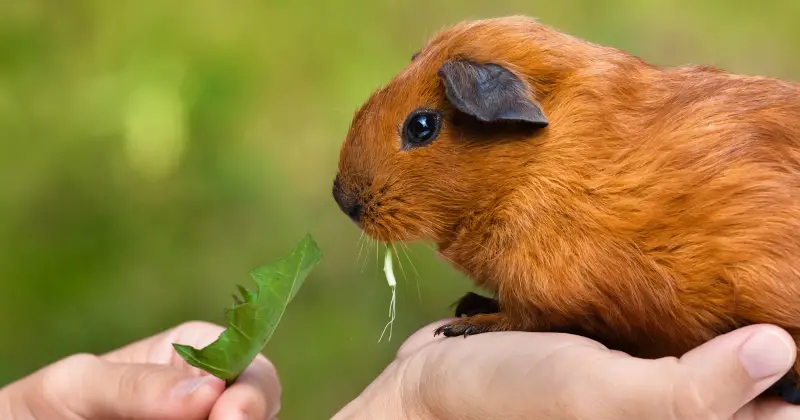
Guinea pigs can indeed be overfed, but providing them with a balanced diet consisting of safe and nutritious options will help prevent this problem. Their diet should primarily consist of hay, preferably Timothy, bluegrass, meadow grass, and orchard grass hays. These types of grasses have the right balance of nutrients and fiber for your guinea pig’s health.
In addition to hay, fresh vegetables are an essential part of their diet. Leafy greens, such as romaine lettuce, cilantro, and bell peppers, are great choices to include in their daily menu. However, it’s essential to feed veggies in moderation to avoid overfeeding. A good rule of thumb is providing one cup of fresh veggies daily for each guinea pig.
When it comes to fruits, remember that not all of them are suitable for guinea pigs. Apples, for example, can be fed occasionally and in small quantities. Make sure to remove the seeds before giving them to your furry friend, as these can be harmful to them.
Avoid store-bought treats as these often contain empty calories and can lead to overfeeding and obesity. Instead, focus on providing a balanced meal with high nutritional value.
Lastly, alfalfa hay can be another option, but it should only be fed to guinea pigs below six months of age due to its high calcium content. Switch to Timothy or orchard hay after they reach six months to maintain a balanced diet.
By offering your guinea pig a variety of safe and nutritious foods, you can prevent overfeeding and ensure they remain healthy and happy.
Monitoring Your Guinea Pig’s Health

Ensuring your guinea pig stays healthy involves keeping an eye on their diet and weight. Monitoring their weight regularly can help you detect potential issues early before they worsen. Maintaining a balance between underfeeding and overfeeding your guinea pig is essential.
It’s a good idea to weigh your guinea pig once a week using a small kitchen scale. If you notice a sudden increase or drop in weight, consult your veterinarian for guidance. Remember, an overweight guinea pig can face many health problems, such as obesity and digestion issues.
When feeding your guinea pig, you should provide them with a mixture of grass hay, a small number of pellets, and about one cup of vegetables per day. This will ensure they receive vital nutrients like vitamin C and fiber necessary for their well-being.
Besides weight, pay attention to your guinea pig’s urine and feces. Keep an eye out for diarrhea or changes in the consistency of their stool, as this could indicate digestive problems. Guinea pigs with gastrointestinal issues may experience gas, bloating, and discomfort in their stomachs.
If you notice unusual behavior or suspect that your guinea pig is experiencing health issues, it’s always best to consult a veterinarian. They can help determine if adjustments should be made to your guinea pig’s diet or if further treatment is needed. After all, maintaining your guinea pig’s health involves regular check-ups and staying informed about their needs.
FAQs:
What should be included in a healthy guinea pig diet?
A healthy guinea pig diet should consist of a variety of vegetables, high-quality pellets specifically designed for guinea pigs, and unlimited access to fresh hay, such as Timothy hay. This balanced combination provides the necessary nutrients, fiber, and chewing exercise for their dental health.
Are commercial guinea pig treats necessary for their diet?
While commercial guinea pig treats can be a fun addition, they should be given sparingly. These treats often contain high sugar or fat content that can lead to weight gain and other health issues. Focus on providing a nutritious, well-rounded diet with fresh vegetables and limited treats.
How can I ensure a balanced diet for my guinea pig?
To ensure a balanced diet, offer a variety of vegetables to provide essential nutrients. Include mostly green leafy vegetables like kale, spinach, and romaine lettuce, as they are particularly beneficial. Additionally, maintain ample water availability and consider an automatic water dispenser for a steady supply.
Is calcium intake important for guinea pigs?
Yes, calcium is an essential nutrient for guinea pigs, but excessive calcium can lead to health problems like bladder stones. It’s important to strike a balance. Provide a variety of vegetables with a suitable calcium content and avoid offering excessive calcium-rich foods or supplements unless advised by a veterinarian.
How much grass should I offer to my guinea pig?
Guinea pigs love grazing on grass, and it’s a great addition to their diet. Aim for a steady supply of fresh grass, free from pesticides, in a secure and supervised environment. Ensure they have access to a clean and spacious area with an ample supply of grass to nibble on throughout the day.
Remember, each guinea pig has unique dietary needs, and it’s essential to observe their behavior, monitor their weight, and consult with a veterinarian for specific guidance on their diet.






